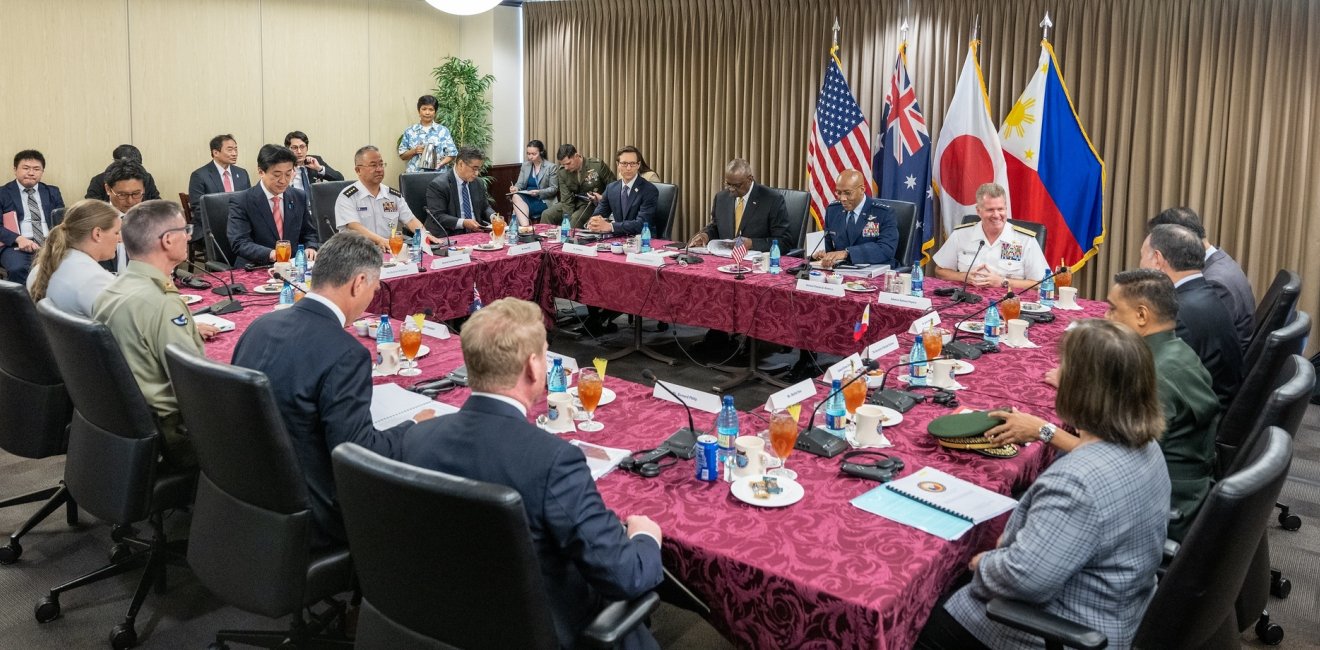
A blog of the Indo-Pacific Program
In recent weeks, a new minilateral in the Indo-Pacific has emerged: the “Squad,” as it is dubbed informally in the Pentagon. The new grouping of Australia, Japan, the Philippines, and the United States coalesced during a Defense Ministers’ meeting in Hawaii in May 2024, following up on a previous gathering at the 2023 Shangri-La security dialogue. With its traditional security focus, the Squad adds another layer to the developing latticework architecture in the Indo-Pacific. But does it mean that the old Australia-India-Japan-US Quad is obsolete?
Unlike the original Quad, the Squad is about traditional hard power security, hence the “S” appended to its name. The meeting readout makes this abundantly clear, directly naming the People’s Republic of China as the aggressor in the East and South China Seas. This meeting builds on several years of effort and defense cooperation between all four powers, including joint naval patrols in the South China Sea. Its hard power security emphasis and the addition of the Philippines instead of India distinguish Squad from Quad.
However, that does not mean that the Squad replaces the Quad, nor that the Quad is deficient. Instead, the Squad and Quad pursue different objectives with different levers of national power, traditional security (hard power) and non-traditional security (public goods) respectively.
For the Squad, an overt focus on traditional security makes sense because each member state already has a mutual defense treaty with the United States and will benefit from deepened quadrilateral cooperation. This places it firmly within the “lattice,” a term describing US-led efforts to enhance its traditional Cold War-era hub-and-spoke security architecture in the Indo-Pacific by encouraging and facilitating defense relationships between US allies and partners. In this case, the Squad is designed to specifically counter the maritime threat from Beijing in the East and South China Seas.
Meanwhile, the Quad is not an Indo-Pacific NATO, nor is it a traditional military alliance. Due to India’s partner status and non-aligned foreign policy, Washington does not expect New Delhi to become a belligerent during a war with China over Taiwan. Neither does New Delhi expect the US military to join it in direct combat operations along its disputed border with China.
Yet, that does not mean the Quad does not contribute to Indo-Pacific security. What was initially termed the “Quadrilateral Security Dialogue” became the Quad to highlight its pursuit of non-traditional security issues. As India’s Foreign Minister S. Jaishankar described in early 2024, the Quad is about ensuring a free and open Indo-Pacific through its material contributions to public goods and regional order.
Moreover, although the Quad’s annual summit appears in doubt this year due to the US election, it also brings together the four national leaders to engage in strategic-level talks on a regular basis. That level of interaction is important. The Quad includes both leaders’ and foreign ministers’ tracks, while the Squad so far operates only at the minister of defense-level.
Finally, although India diverges with the other four partners on Russia and some aspects of international order, New Delhi’s inclusion in the Quad serves to keep it engaged in upholding a rules-based order against the revisionist threat from China. The Philippines already shared a longstanding mutual defense treaty with the United States prior to the Squad, but the Quad is necessary to institutionalize India’s growing bilateral relationships with each of the other four Quad members.
Thus, the Squad and Quad complement each other. Each minilateral focuses on different aspects of supporting a rules-based order against efforts to undermine it. The Squad formalizes and enhances four power security discussions in the maritime domain amid increasing Chinese gray zone pressure against the Philippines. The Quad provides public goods to enhance the Indo-Pacific’s prosperity and rules-based order. Both are necessary.
The views expressed are the author's alone, and do not represent the views of the US Government or the Wilson Center. Copyright 2024, Indo-Pacific Program. All rights reserved.
Author


Indo-Pacific Program
The Indo-Pacific Program promotes policy debate and intellectual discussions on US interests in the Asia-Pacific as well as political, economic, security, and social issues relating to the world’s most populous and economically dynamic region. Read more





